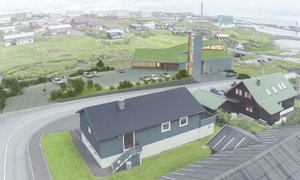Graema Smith
Glasgow
Once Aberdeen had a small, almost quaint airport, like Vagar, but that has long since gone. The discovery of oil led to the development of the modern international airport and bustling heliport, the busiest in Europe, which
Aberdeen now boasts. Aberdeen has changed out of all recognition because of the oil industry and the challenge for the Faroes, if oil is discovered in its waters, will be to capitalise on the opportunity yet retain the unique charm of the islands.
Aberdeen and the North-east of Scotland have reaped huge benefits from the oil and gas industry but there have been downsides. House prices have escalated, as have retail prices. Unemployment is the lowest in Scotland but the high wages offered by the North Sea operators and contractors have prompted workers to abandon the indigenous industries.
Aberdeen learned a harsh lesson in the eighties when the oil price slumped and the industry went into recession. House prices fell so dramatically some people simply handed their keys into their building societies and told them ?Sell the house if you can, I?m off.?
Rear window stickers appeared in cars all over the city pleading with the Almighty for a second oil boom and promising, in less than reverend terms, not to waste a second opportunity. The second boom, albeit less dramatic, has arrived, the promises have been kept and great care has been taken this time to try to avoid any more boom to burst scenarios. Companies have expanded their horizons and diversified so their fortunes are far less dependent on the daily fluctuation of the oil price and the Faroes Islands must carefully balance the huge opportunity which the industry can bring with the retention of the islanders? core values and the very special atmosphere of the islands.
The first gas was discovered in the North Sea by BP in their West Sole Field in 1965 and two years later Amoco found the first oil in the Arbroath field.
It was 10 years before the first oil was brought ashore from Hamilton?s Argyll Field and by 1978 production had reached a million barrels a day.
Aberdeen was enjoying unprecedented prosperity with hotel rooms at a premium and hardly a seat available in the rapidly increasing number of restaurants inn the city which had truly become cosmopolitan with American, French and Dutch schools opening.
However it had become too dependent on oil and when in 1986, with no warning, the price plummeted from $30 to less than $10 in less than a month the city was rocked to it?s granite foundations. It was estimated that 6000 out of 28,000 offshore jobs disappeared along with thousands more onshore.
A leaner and meaner oil industry emerged from the slump focused on driving down costs to make the North Sea more globally competitive and with each year since the drive has gathered fresh impetus.
The industry was picking itself up again and optimism was creeping back into the plans when, on July 6, 1988, 167 men died in the accident most in the North Sea industry said could never happen. Red Adair was not amongst them.
The famous Texan fire fighter had warned in the 1970s that whatever precautions were taken there would be a disaster in the North Sea sooner or later. His words were prophetic and it was he who was called to douse the flames on what was left of Occidental?s Piper Alpha platform.
It was a tragedy which was to have a world wide impact on safety.
Even before Lord Cullen issued his comprehensive report with 106 recommendations in 1990 the industry had spent £1 billion on safety improvements. It has been estimated a further £4 billion has been spent on safety improvements since then. UK offshore safety standards are now the most stringent in the world and as UK companies spread their expertise around the globe they carry these standards with them.
Lord Cullen?s report prompted a fundamental change in how safety offshore was handled.
The responsibility for safety was taken away from the Department of Energy and handed to the Health and Safety Executive.
In tandem the onus was placed on operators to develop individual safety systems based on installation safety cases rather than follow prescriptive rules.
The industry now claims that in terms of major accidents it is safer than industries such as construction, post and telecoms, water, food and drink manufacturers and more than four times safer than mining and safer than recreational and sporting activities.
The industry continued to thrive through the 1990s although the two most common words were ?cost reduction.?
The CRINE (Cost Reduction in the New Era) initiative was launched in 1993 with the aim of persuading operators and contractors to share risk and reward and in so doing achieve an initial 30% saving on capital projects.
Alliancing and partnering became the buzz words and CRINE proved a success although it was criticised as an initiative to stifle research and development because margins were so small only the very large companies could afford to carry it out.
Development continued and a record number of wells were started in 1996 but towards the end of the decade recession hit again and in 1998 the average price for Brent crude slumped to under $13. Developments were once again put on hold and the century ended with a year in which the price was down to under $10 a barrel at the beginning at up to more than $26 by the end but hopes were high that the new Millennium would bring new prosperity.
A step towards that had been taken with the formation of the Oil and Gas Industry Task Force in 1998 which was part funded by the Department of Trade and Industry and marked the beginning of a closer working relationship between the government and the industry than ever before as efforts were intensified to try to safeguard the long term future of the industry.
The North Sea oil industry continues to flourish and the North-east economy is buoyant.
There is not expectation of huge fields like Brent and Forties being discovered but advances means that more and more oil is being extracted from those reservoirs discovered in the 1970s.
Brent, for exxample, has just celebrated 25 years of production. Where the first oil was pumped ashore gas was flared off and it was expected that the field would last until 2001.
Now it is a major gas field and the silver anniversary predictions are that it could last another quarter of a century.
Every day existing technologies and methods are being challenged and new ones developed. Compa-nies are drilling deeper, further, and in more demanding conditions and developing skills which will open up new opportunities all over the world.
They now seek work, often through partnerships and alliances, in other oil provinces like South America, the Caspian Sea - and the Faroes.
Fields which just a few years ago provided at that time insurmountable obstacles and were uneconomic are now almost routine.
The North Sea is a mature province but the message the industry is struggling to transmit, particularly to the young, is that it has a long and valuable future and offers excellent career prospects.
Skills shortages are emerging although strenuous efforts are being made to address the problem.
Aberdeen and its population have been transformed by quarter of a century of oil production and it seems certain that the Faroes will also be transformed by the ?world class? prospects in their waters which are being talked about by the normally cautious oil companies.
The drilling has been a long time coming in Faroese waters but momentum is building in what might become an unstoppable force.
The signs which marked the arrival of the industry in Aberdeen and Shetland are appearing in the Faroes.
At times when the ?vacancies? signs might be expected to be on display Faroese hotels are full of oilmen carried there on the increasingly frequent flights of the islands? own and highly regarded Atlantic Airways.
The oil companies are also beginning to focus on the prime office accommodation.
There will be many challenges to the Faroese in the near future. Will the tourist industry, which can benefit from improved links with the mainland suffer because all the available hotel rooms are filled by oil personnel.
Will significant numbers of oil industry workers choose to make their homes in the Faroe Islands and push up the prices in the same way as happened in Aberdeen forcing them beyond the reach of most of those not involved in the industry which, although slimmed down, still pays high salaries?
Will the islands? fishermen be tempted into the oil industry causing irreparable damage to the fishing industry?
Aberdeen has enjoyed unprecendented prosperity because of the discovery of black gold in the North Sea and if the same black gold lies in Faroese waters it presents a superb opportunity.
The oil industry has been a long time coming to the Faroes, not least because of boundary disputes, and that time has been well used in preparation.
Hopefully that preparation will maximise the benefits to the 45,000 islands and minimise the inevitable changes in their lives.














